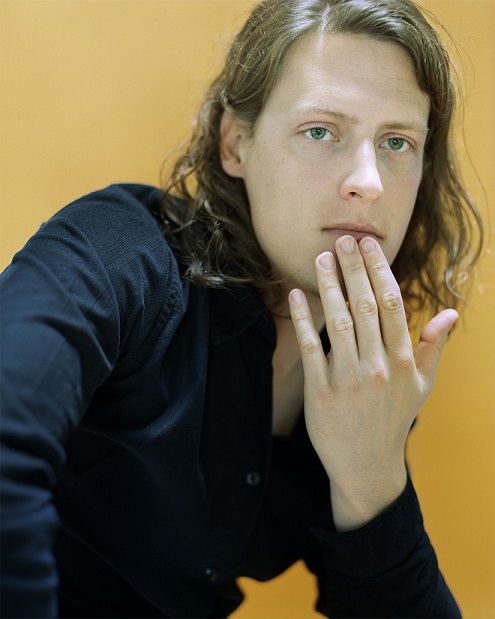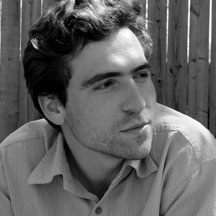
Mon. 6-26-17. O’Brien’s, Boston, MA. Doors @ 8p. $10.
Further dates starting 6-21-17 on his site.
Robert Griffin Lowe has a ten-year career with instrumental band Balmorhea. But the 32-year-old Austin-based musician decided to spend four years of his musical life listening to pop records and recording one. We talk about Stevie Wonder, Lowe’s own Slow Time, and politics influencing music.
M Keefer: You started playing music at seven years old. I remember being around nine or ten, going “Man, do I really have to practice today?”
RG Lowe: For me, too, it was definitely like that. It was like a chore at a young age. Once I got to middle school, I picked up the acoustic guitar and started playing guitar and taking guitar lessons from this guitar teacher, who’s… this old, kind of Dead-Head, hippy guy. Brilliant guitar player. I think that was the first time I realized music could be more than practicing piano thirty minutes a day. He exposed me a little bit to the counter-cultural relevance of music, or like the creative elements of it. I think probably around middle school, I was like, “I’m a musician,” this is a part of my identity.
MK: Who are your go-to bands to listen to?
RGL: That really depends on the context. For this project [Slow Time] my main inspiration… Stevie Wonder was my…
MK: Spirit muse?
RGL: Yeah. And really his records from the ’70s was some of my favorite music ever made. It took me four years to write this music and make this record. Those records are still incredibly relevant to me.
MK: On the dot; Stevie Wonder is brilliant. I love Talking Book and his triple album – or really two-and-a-half album.
RGL: That’s Songs in the Key of Life. That album to me is probably my favorite pop record ever made. Or maybe the two before, Innervisions and Fulfillingness’ First Finale. That trilogy of records to me is everything that I want in pop music. It’s complicated, it’s deep, but it’s also positive and inspiring and comes off effortlessly. I think it’s something I aspire to write that kind of music.
MK: I totally get that. There’s a groove, but it’s also – especially on Innervisions – political, about social justice.
RGL: For sure. It’s all there for me: it’s about love, it’s political, it’s about suffering, but it’s also about having a good time. He has this expansive outlook and expression in his music that encapsulates a bunch of different types of human consciousness and feeling. I don’t think I really succeeded at that, but it inspired me to try to write a collection of songs that expresses a range of different things I was feeling or experiencing… That’s what I love about those Stevie Wonder records, that they can be so beautiful and devastating and sad and uplifting at the same time.
MK: I listened to some music from your other band, Balmorhea, and it feels a lot more introspective, while Slow Time feels more extroverted.
RGL: I think by nature instrumental music comes across as introspective, because it has no explicit content markers. It’s all basically mood or feeling, atmopshere. It allows you to create your own narrative. What sounds sad to somebody sounds a little hopeful to someone else. In pop music, foundationally it’s the same thing. The feeling of a song is so much more than what the lyrics tell you what to feel. But there’s a lot more clear markers… you’re telling people what to think about, or how to think about what you’re saying. I’d never done it before… I’d never written a song in that kind of traditional sense. It basically took two years of pretty constant, we’ll call it “exercise,” in the studio by myself, trying things out, throwing things against the sound.
MK: I’m addicted to your single, “Cover You.” Who influenced that?
RGL: Prince definitely… that one’s definitely the most danceable. The phrase that you hear come in after the intro [sings, snaps fingers] – I had that for a year before I could figure out what to put on top of it! When I started listening to more Prince at that moment, I could use him a little bit as my starting point for that song.
MK: It’s funny that that musical lick annoyed you to the point that you had to do something with it.
RGL: In my experience, it comes in these little pieces, and you just have to be patient. They come together on their own time.
MK: Is this your first solo tour?
RGL: It’s a short little two weeks, up to you guys in Boston, then across to Chicago, then back down. I tour a lot with the other band, and these guys that I’m playing with… I feel super lucky to be playing with them. They’re all way better musicians than I am. We’ve all been excited to get out on the road and start playing every night. I think a band really becomes a band once you go on tour… It’s something I’ve been really excited about for the past year. We’ll be playing really small rooms. I don’t think I’ve ever been to O’Brien’s in Boston – have you been there?
MK: I haven’t, but it sounds fairly small. Maybe bang in 50-75 people.
RGL: I think so. I think this music will work well in those types of settings.
MK: Four years on this project! I don’t know if you’re ready to think about this, but where do you think you want to explore next musically?
RGL: I don’t know how to describe aesthetically where I want to go, but… my process for writing Slow Time was very hodge-podge… it was really a product of a lot of different styles of working. I would stick things together that I didn’t know if they would work. For whatever I’m going to do next, I want to try to have more a concerted effort to have the bones of the song be solid from the start. I think it’ll be driven more by piano than the Wurlitzer. I’m trying to force myself to write songs that I can sing and play on the piano. I imagine there’s going to be more jazz elements in this next one, and it might be a little more stripped-down. I want to do it faster. I don’t want to take four years to do the next one!
MK: More generally, where do you want to explore next? Other aspects, that might influence your music tangentially.
RGL: I think the only answer to that would be that the political climate in the country is inescapable. I wrote Slow Time over the end of the Obama Era. I felt very comfortable to write a collection of songs that’s pretty self-focused, inwardly focused. The political change that’s happened in this country in the past year, year and a half is unavoidable for any artist…
MK: Not to address.
RGL: Yeah. I don’t think I’m going to write a protest record. But it would be impossible to not write about all of the fear and anger that I’m watching in this country, and really around the whole world. I haven’t quite figured out what that’s going to look like yet, but I want to use my voice and my music as a tool to give voice to the way that people are feeling. That’s what music does the best.
MK: Let’s wrap it up. I’ve never been to one of your shows; what should I expect in Boston?
RGL: If you like the record I think you’ll find the live shows to be an excavation of the records, a further development and application of that music into a live setting. My band is really killer, and don’t take credit for that, they’re great musicians. I think if you come to the show at O’Brien’s, I think people might want to dance along.
More dates starting this week at: www.rglowe.com
